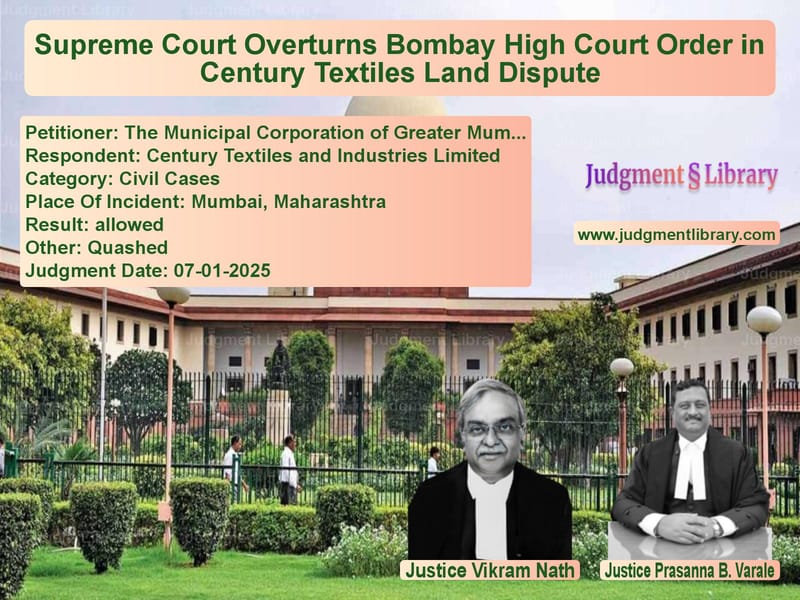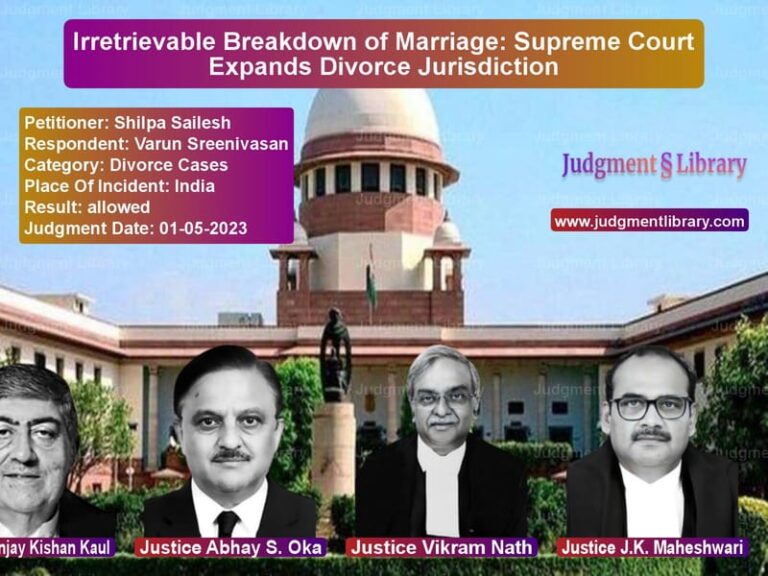Supreme Court Overturns Bombay High Court Order in Century Textiles Land Dispute
The Supreme Court of India has recently ruled in favor of the Municipal Corporation of Greater Mumbai (MCGM) in the case of The Municipal Corporation of Greater Mumbai & Others vs. Century Textiles and Industries Limited & Others. This landmark judgment overturned the Bombay High Court’s decision that had directed the execution of a formal conveyance of a disputed plot in Mumbai to Century Textiles. The Supreme Court’s ruling highlights the importance of statutory interpretation, delay and laches in legal proceedings, and the conditions for public-private partnership agreements.
Background of the Case
The dispute revolved around a piece of land in Lower Parel, Mumbai, originally leased to Century Textiles in 1928 for a period of 28 years under the Poorer Classes Accommodation Scheme (PCAS). Under the lease agreement, Century Textiles was to construct and maintain housing units for lower-income workers.
The lease was to expire in 1955, and according to Century Textiles, the land was to be formally conveyed to them after the lease period. However, no conveyance deed was executed, and the company continued to occupy the land without any legal action from MCGM for decades.
Read also: https://judgmentlibrary.com/supreme-court-ruling-on-stamp-duty-valuation-in-property-transactions/
In 2016, Century Textiles filed a writ petition before the Bombay High Court, seeking a direction for MCGM to execute a formal deed of conveyance in their favor. The High Court ruled in favor of Century Textiles, prompting MCGM to appeal the decision before the Supreme Court.
Arguments by the Appellants (MCGM)
MCGM, represented by senior counsels, made the following key arguments:
- Delay and Laches: The writ petition was filed after an inordinate delay of 61 years since the expiration of the lease in 1955. Even after sending a legal notice in 2006, Century Textiles failed to take legal action for another decade before filing the writ petition.
- Statutory Interpretation: MCGM argued that under Section 51(2) of the Bombay Improvement Trust Transfer Act, 1925, the words “shall convey” should be interpreted as “may convey,” meaning that conveyance was not automatic but conditional upon further approval and payment.
- Lease Terms: The lease agreement did not explicitly grant an automatic right of conveyance at the end of the lease period. Instead, it required compliance with specific conditions, including continued use for public welfare.
- Public Interest and Policy: Allowing conveyance of prime public land to a private entity without payment would amount to an unjust enrichment and a loss to the public exchequer.
Arguments by the Respondents (Century Textiles)
Century Textiles argued:
- Lease Agreement: The lease deed and Board Resolution No. 325 of 1927 clearly stated that Block A would be conveyed to them upon completion of the lease term.
- Public-Private Partnership: The scheme under which the land was leased was designed to provide affordable housing through private-sector involvement, and the company had fulfilled its obligations.
- Interpretation of Section 51(2): The phrase “shall convey” in the 1925 Act imposed a mandatory duty on MCGM to execute the conveyance.
- No Opposition for Decades: MCGM never sought eviction or raised any objections for 61 years, thereby implying acquiescence.
Supreme Court’s Analysis and Judgment
1. Delay and Laches
The Supreme Court ruled that Century Textiles was guilty of undue delay in filing the writ petition, stating:
“Litigants cannot sit on their rights indefinitely and approach the court after an unreasonable delay, causing unnecessary hardship to the other party.”
It emphasized that the limitation for filing a suit under the Mumbai Municipal Corporation Act, 1888, was six months, and Century Textiles had failed to act within a reasonable time.
2. Statutory Interpretation of Section 51(2)
The Court clarified that Section 51(2) of the 1925 Act did not create an automatic right to conveyance:
“The phrase ‘shall convey’ must be read in conjunction with the overall statutory scheme and does not create an unqualified obligation on the part of MCGM to execute a conveyance.”
It ruled that conveyance was conditional upon compliance with statutory requirements and payment of due costs.
3. Lease Agreement Interpretation
The Court held that the lease did not contain any clause mandating conveyance upon expiry:
“A lease agreement, by itself, does not confer ownership rights. It merely grants a temporary right of use and occupation.”
It rejected the argument that Board Resolution No. 325 created a binding obligation for MCGM to transfer ownership.
4. Impact on Public Interest
The Supreme Court warned against allowing private entities to benefit from public land without adequate compensation:
“Allowing such conveyance without due process would set a dangerous precedent where valuable public assets could be lost to private parties without adequate consideration.”
Final Judgment
The Supreme Court set aside the Bombay High Court’s order and dismissed the writ petition filed by Century Textiles:
“The appeal is allowed. The judgment of the Bombay High Court is set aside, and the writ petition is dismissed with no relief granted to the respondents.”
Conclusion
This ruling reinforces key legal principles, including the need for timely legal action, the importance of statutory interpretation, and the protection of public assets. By overturning the High Court’s decision, the Supreme Court has ensured that municipal authorities retain control over public land and that private entities cannot claim ownership rights without fulfilling all legal obligations.
Read also: https://judgmentlibrary.com/supreme-court-upholds-maxim-indias-ownership-in-karnataka-land-dispute/
Petitioner Name: The Municipal Corporation of Greater Mumbai.Respondent Name: Century Textiles and Industries Limited.Judgment By: Justice Vikram Nath, Justice Prasanna B. Varale.Place Of Incident: Mumbai, Maharashtra.Judgment Date: 07-01-2025.
Don’t miss out on the full details! Download the complete judgment in PDF format below and gain valuable insights instantly!
Download Judgment: the-municipal-corpor-vs-century-textiles-and-supreme-court-of-india-judgment-dated-07-01-2025.pdf
Directly Download Judgment: Directly download this Judgment
See all petitions in Property Disputes
See all petitions in Contract Disputes
See all petitions in Specific Performance
See all petitions in Judgment by Vikram Nath
See all petitions in Judgment by Prasanna Bhalachandra Varale
See all petitions in allowed
See all petitions in Quashed
See all petitions in supreme court of India judgments January 2025
See all petitions in 2025 judgments
See all posts in Civil Cases Category
See all allowed petitions in Civil Cases Category
See all Dismissed petitions in Civil Cases Category
See all partially allowed petitions in Civil Cases Category







